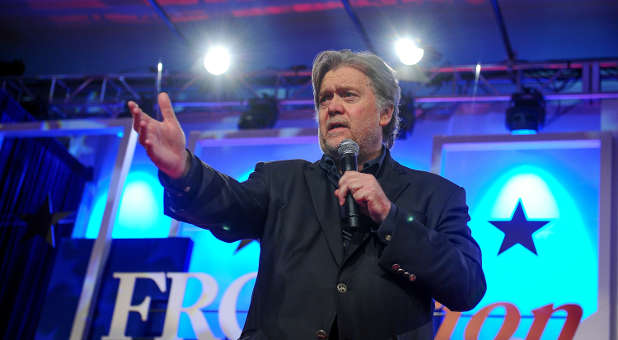I Agree With Bannon: Trump Will Top 400 Electors in 2020 Partly Due to Christian Vote
Former White House strategist Steve Bannon made a bold prediction at the Values Voters Summit in Washington, D.C. in mid-October: “President Trump’s not only going to finish this term,” he said, “he’s going to win with 400 electoral votes in 2020.”
Predictably, the mainstream media scoffed at the idea. The editors of Vanity Fair were only giving Trump a 30 percent chance of finishing his first term, and Bannon was already predicting a second victory.
In the past 50 years, the only incumbent president to win with more than 400 electoral votes was Ronald Reagan, with 525. Bill Clinton got 379 electoral votes in 1996, George W. Bush hit 286 in 2004, and Barack Obama reached 365 in 2008. Trump won with 304 electoral votes in 2016 while his opponent topped out at 227. So what, pray tell, was Bannon thinking?
If the outspoken Breitbart editor is right, Trump will need 100 more votes than he received in 2016. A risky proposition, indeed, but I’m convinced Bannon got it right. Furthermore, saying it at the Values Voter Summit was a smart move, because it was the evangelical vote that put Trump over the top. Evangelicals gave the Republican candidate a whopping 82 percent of their votes, while Clinton received just 16 percent—the lowest number ever recorded for a Democratic presidential candidate.
In my new book God and Donald Trump, I document what really happened in this contentious election from one year ago, and how evangelicals and Roman Catholics managed to overcome their natural resistance to give the New York billionaire their support. Many never-Trumpers were troubled by Trump’s multiple marriages, his casinos, and especially his indiscreet remarks in the video aired by Access Hollywood. But they eventually came around to his message.
Donald Trump is no choirboy, and has never been known to be much of a Christian, but he was saying what middle-America wanted to hear. He was bold, assertive, unflappable, and even his biggest flaps worked in his favor. The men and women in flyover country were angry with Washington. They were concerned about the impact undocumented immigrants were having on their communities, and rightfully afraid of the threat of radical Islamic terrorism. Donald Trump was the one candidate willing to take a stand on the issues these voters cared about.
As the campaign gained momentum over the summer, evangelicals came to believe Trump would champion their issues. And once it became clear the Democratic candidate was to be the most left-leaning and anti-Christian candidate in U.S. history, the matter was settled. So, while the media insisted Hillary Clinton had the election sewn up, Trump was swept into office by a wave of support from men and women in the heartland—including many first-time voters—who felt they had been deceived and deserted by the political class.
The emotion Steve Bannon has tapped into is a volatile force. For the past eight years, a lot of anger has been boiling under the surface. The nation was rapidly approaching a tipping point, and the revolution that took place on November 8, 2016, was the first and clearest expression of the public’s disappointment with government as usual. Donald Trump was elected specifically because he was not a politician. He was not part of the Beltway crowd, and that’s what the voters were demanding.
It is clear now that Donald Trump understood the importance of the Christian vote. He courted values voters, spoke openly about his faith and accepted invitations to speak to the Christian media. He promised to tackle the issues they cared about, and it proved to be a winning strategy. The Clinton campaign, on the other hand, ignored the Christian vote and referred to Trump’s supporters as a “basket of deplorables.” Darrell Scott, the African American pastor who spoke at the Republican National Convention, says it was the prayers of the faithful that lifted Donald Trump to victory, and he’s right about that.
Since the election, I’ve spoken with many ministry leaders and prophetic voices who are convinced God brought Trump—who had said he wasn’t interested in holding public office—to this place for this time. It may well be, as former congresswoman Michele Bachmann told me, that Trump was sent as a proverbial bull in a china shop to break up the globalist agenda and interrupt the Left’s campaign to remake America in its own image. A man with a milder, gentler, less aggressive personality could never hope to take on the forces within the political establishment and prosper, which is why Donald Trump was the perfect choice for this hour.
In God and Donald Trump, I set out to examine the spiritual dimensions of what was happening in America during the 2016 campaign. I’ve taken a close and personal look at the candidates and their issues, and I have spoken to and interviewed dozens of politicians and pastors who believe God had an active role in these events. And the more I learned, the more I came to appreciate the truly monumental transformation we are undergoing.
Steve Bannon described the populist revolt taking place in the country today as a powerful movement of working-class and middle-class people who are fed up with the permanent political class and the globalist set of elites running the country. That’s true, but the reality is greater still.
Hillary Clinton, who ran a terrible campaign, titled her new book What Happened? My book answers the question: God intervened. He has given the nation a fresh start: but what will we do with it?
I encourage you to buy a copy at either your local bookstore or online at Amazon.com, CBD.com or barnesandnoble.com. Please visit the website GodandDonaldTrump.com to download a free chapter. {eoa}
This article originally appeared on dailycaller.com.
















































